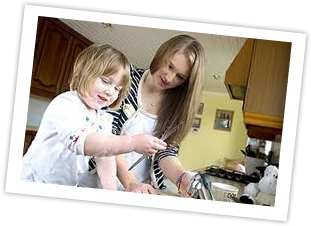- Au Pair Schedule 101
- Single Parents Can Reduce Stress with Au Pairs in America
- Au Pair vs Nanny vs Day Care
- How An Au Pair Fits Into Routines
- A Great and Affordable Child Care Solution
- Words From Our Au Pair Community Counselors
- Why an Au Pair is much more than a Nanny?
Why an Au Pair is much more than a Nanny?

The need for in-home child care has increased dramatically in many developed countries within the last century. As it is more common that both parents work outside of the home; and work hours beyond what traditional school or child care accounts for, a more intimate form of child care is being sought.
Au pairs hold a role similar to the traditional “nanny”. They are in many ways more appealing than a babysitter or child care facility. The greatest difference between a traditional nanny and an au pair is that an au pair is a foreign national visiting the host country. Au pairs are thus traditionally younger than nannies and although not professional child care providers, they do have some child care experience. Au pair programs require some educational inclusion, usually in terms of language or culture classes.
There are many reasons to choose an au pair, but several make them significantly stand out from other in home child care options.
Au Pairs Become Like Family:
Au pairs classically become more meaningful to a family than just a domestic worker or occasional babysitter. An au pair is a live-in child care provider. She is offered a private room in the home and is provided with food and equal access to basic utilities. She will usually share meals with the family, and will join the family for most activities. She may wish to share her private time in the evenings with the family. Children usually form a secure bond of trust and safety with their au pair. The au pair will also have a level of connection and understanding of the children that other positions may lack as they become a true member of the family. Having this positive and respectful relationship is also an excellent model for young children. Au pairs traditionally stay with a host family for a year, although they can now legally extend for an additional twelve months.
Au Pairs Bring a Fresh Cultural Experience to Families and Children:
Much like having a foreign exchange student, an au pair will bring with them their language, culture, and interests. They will be able to positively share these interests and perspectives with children. Having an au pair care for preschool or school-aged children commonly increases the child’s tolerance, cultural awareness, empathy, and openness. An au pair may also share their language with the child, creating a bilingual experience that can be very enriching for young children.
Au Pairs Provide Direct Support:
There are limits established to what are expected of au pairs, and limits to the number of hours per week they provide child care. However, since they are integrated into the family, they are much more available and flexible as providers than other child care positions may be. They can care for the children at basically any time necessary including late in the evenings, at night, or early in the mornings when other child care options may not be possible.




